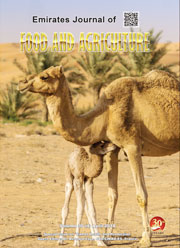THE RESPONSE OF SLOW-GROWING CHICKS TO THE SUPPLEMENTATIONS WITH DIFFERENT METHIONINE LEVELS AND/OR TWO TYPES OF ENZYMES
DOI:
https://doi.org/10.9755/ejfa.v12i1.5175Keywords:
Enzymes, meat quality, methionine, productive-performance, slow-growing chicksAbstract
In order to study productive performance and meat quality of slow-growing chicks used for rural poultry production in relation to methionine and enzyme supplementations, basal diets were formulated to contain 0.32, 0.29 and 0.27% methionine levels from 1 to 42 d of age, 43 to 84 d of age, and 85 to 98 d of age, respectively. These diets were supplemented with 0, 0.06 and 0.12% of DL-methionine; thus, there were three methionine levels during each period. These levels were fed with or without 750 FTY of phytase-6 or one g/kg of multienzymes; thus there were three methionine levels by three enzyme treatments in factorial design. Methionine levels of 0.44, 0.41 and 0.33% significantly increased productive performance from 1 to 42, 43 to 84 and 85 to 98 d of age, respectively. Phytase supplemented-basal diet and diet supplemented with 0.06% methionine and phytase yield similar productive performance to those of chicks fed diet supplemented with 0.06% and 0.12% methionine, respectively. Phytase improved significantly nutrient digestibilities, percentage dressed carcass and chest parts compared to the control and multienzymes groups. Increasing methionine levels by 0.06 and 0.12% improved significantly percentage dressed carcass, chest and hind parts by 2.2 and 2.7, 1.4% and 2.8 and 3.1 and 2.5%, respectively. However, the methionine level and/or type of enzyme supplementations did not significantly affect metabolic profiles such as plasma total protein, albumen, globulin, total lipids and cholesterol.










 .
. 